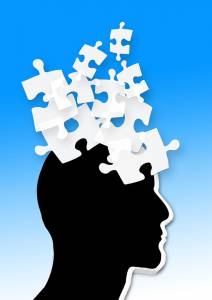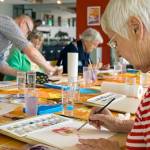The complex organ known as the brain, commands the human nervous system. The gray matter contains around 90 billion nerve cells, also known as neurons. The white matter in the brain features billions of nerve fibers, known in scientific terms as axons and dendrites. Trillions of synapses, or connections, connect the brain’s neurons. The incredible complexity of the brain is key to sophisticated cognitive functions, including memory, logic, language, attention, and perceptual awareness. When brain cells become damaged, an individual’s life is ultimately altered.
 Dementia is a condition that stems from damaged brain cells. In itself, dementia is not a disease. Rather, dementia is an umbrella term that groups together specific symptoms that reveal a decline in a person’s ability to think, remember and function in daily life.
Dementia is a condition that stems from damaged brain cells. In itself, dementia is not a disease. Rather, dementia is an umbrella term that groups together specific symptoms that reveal a decline in a person’s ability to think, remember and function in daily life.
Alzheimer’s disease is the most familiar form of dementia, occurring in 60 to 80 percent of cases of dementia. Vascular dementia occurs after an individual experiences a stroke, and is the second most common form of dementia.
Forgetfulness in itself does not signal the onset of dementia. Plenty of older adults experience memory loss that is caused by reversible issues, such as those related to the thyroid, depression, medications, vitamin deficiencies and excessive alcohol use, and are not related to dementia.
Dementia Symptoms Are Diverse
Dementia symptoms can vary significantly. However, the Alzheimer’s Association indicates that mental impairment in at least two of the following crucial mental functions may signal the presence of dementia:
- Memory
- Communication and language
- Reasoning and judgment
- Attention span and ability to focus
- Visual perception
Subtle changes in short-term memory are also good indicators of early-onset dementia. While seniors with dementia can recall a memorable vacation that took place 15 years ago, they will have trouble remembering what they ate for lunch.
Short-term memory impairment can present itself in additional ways. Frequently, dementia patients may forget where they left their car keys; they’ll have no recollection as to why they entered a particular room; they may forget to go to scheduled doctor’s appointments.
Communication is affected by the onset of dementia. Dementia patients express themselves with great difficulty, as they struggle to find the right words to string sentences together.
Early indications of dementia include mood changes. Depression, for example, affects elderly individuals early on. Judgment is often impaired as well, resulting from shifts in personality. A typically shy senior may suddenly transform into an outgoing one in the blink of an eye when dementia takes hold.
A loss of interest in hobbies and activities that once stimulated a senior can also signal the onset of dementia. Seniors may appear emotionally apathetic, no longer desiring to spend time with family and friends.
The inability to function in daily life is triggered by dementia. Complex tasks, like balancing a checkbook or following sets of rules to play games, become increasingly challenging as dementia sets in. New routines or new ways of doing things become difficult to follow.
Elderly individuals with dementia experience confusion, which can take the form of being unable to recognize faces or remember someone they’ve previously met.
Memory loss can spur repetitive behavior. A person with dementia is more likely to repeat activities, such as shaving or asking questions that have been answered.
Healthy Routines Ward Off Dementia
 The Alzheimer’s Association specifies that dementia has no cure or treatment options that slow its progression. When identified early, some symptoms may temporarily improve with medication, therapy and cognitive training.
The Alzheimer’s Association specifies that dementia has no cure or treatment options that slow its progression. When identified early, some symptoms may temporarily improve with medication, therapy and cognitive training.
Visiting a neurologist can help pinpoint whether a senior’s memory is failing due to old age or if dementia is present. Tests that a doctor will order to diagnose dementia include mental and memory tests, a neurological exam, brain imaging tests and laboratory tests.
While both age and genetics play a pivotal role in the onset of dementia, preventing dementia with a healthy lifestyle is key to retaining mental functions. Reading daily stimulates the mind, as does taking part in memory games and completing word puzzles. Physical exercise is important to improve the oxygen and blood flow to brain cells, which may lower the risk of developing certain types of dementia.
An individual’s diet plays a central role in achieving optimum brain health. A healthy heart leads to a healthy brain. Consequently, eating a heart-healthy diet, like the Mediterranean diet, may protect the well-being of the brain. A Mediterranean diet consists of the daily intake of fresh fruits and vegetables, whole grains, fish and shellfish, nuts and legumes, olive oil and healthy fats.
Alzheimer’s and vascular dementia can be linked to changes in blood vessels in the brain. Damaged blood vessels in any part of a person’s body can affect the blood vessels in the brain. Improve cardiovascular health, and the blood vessels in the brain stay nourished. Protect the brain with lifestyle improvements: maintain a healthy body weight; don’t smoke; and regularly monitor blood sugar, cholesterol and blood pressure to keep them within the advised limits.
Dementia Care
When dementia takes hold, seniors and their families can turn to compassionate, in-home dementia care for support and peace of mind. Individuals with dementia benefit significantly with the help of a skilled caregiver trained in dementia care. Assisting Hands Home Care provides dementia care for elderly individuals and their families. Services are designed to stimulate the minds of dementia patients (problem-solving games, conversations and leisurely walks), to help them in daily, routine tasks (bathing and incontinence) and to ensure their daily nutritional needs are met (assistance with meal preparation and eating).
As a family member, it is common to feel overwhelmed by caring for a loved one with dementia. Assisting Hands Home Care understands the difficulty and offers respite care that includes the help of a skilled team of caregivers trained in all aspects of non-medical dementia care. The Assisting Hands Home Care team will meet with family members and care recipients to develop a customized plan that meets the needs of the loved one right in the comfort of home. Assisting Hands Home Care elder care aides provide compassionate, in-home care to allow seniors to live comfortably and with dignity.




